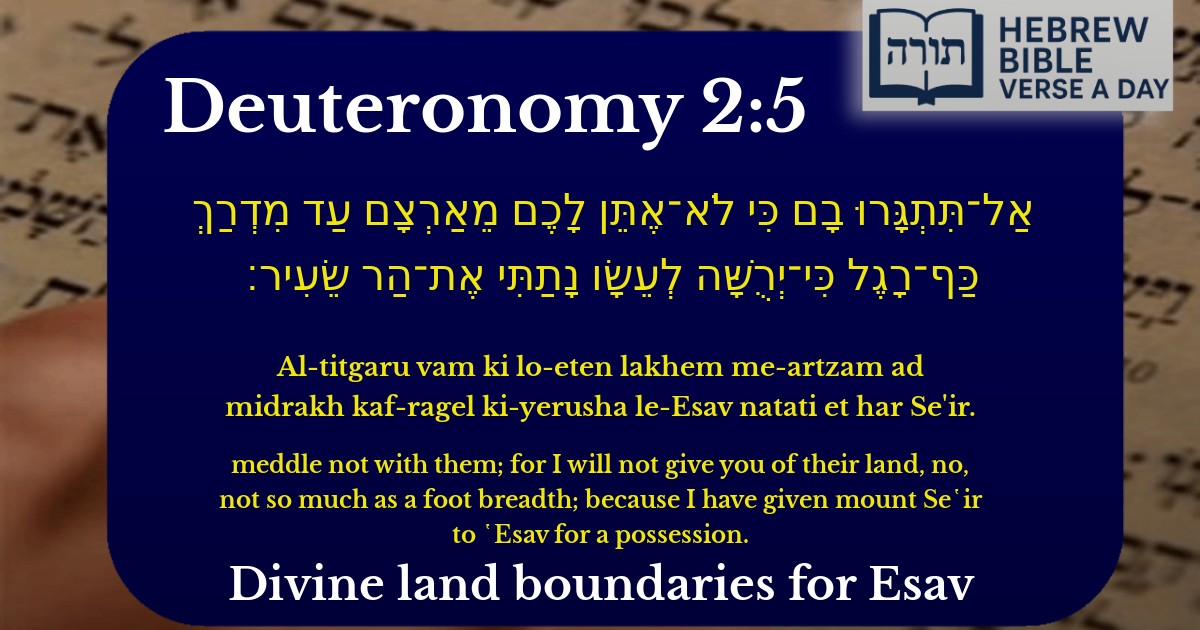Join Our Newsletter To Be Informed When New Videos Are Posted
Join the thousands of fellow Studends who rely on our videos to learn how to read the bible in Hebrew for free!
Hebrew Text
אַל־תִּתְגָּרוּ בָם כִּי לֹא־אֶתֵּן לָכֶם מֵאַרְצָם עַד מִדְרַךְ כַּף־רָגֶל כִּי־יְרֻשָּׁה לְעֵשָׂו נָתַתִּי אֶת־הַר שֵׂעִיר׃
English Translation
meddle not with them; for I will not give you of their land, no, not so much as a foot breadth; because I have given mount Se῾ir to ῾Esav for a possession.
Transliteration
Al-titgaru vam ki lo-eten lakhem me-artzam ad midrakh kaf-ragel ki-yerusha le-Esav natati et har Se'ir.
Hebrew Leining Text
אַל־תִּתְגָּר֣וּ בָ֔ם כִּ֠י לֹֽא־אֶתֵּ֤ן לָכֶם֙ מֵֽאַרְצָ֔ם עַ֖ד מִדְרַ֣ךְ כַּף־רָ֑גֶל כִּֽי־יְרֻשָּׁ֣ה לְעֵשָׂ֔ו נָתַ֖תִּי אֶת־הַ֥ר שֵׂעִֽיר׃
אַל־תִּתְגָּר֣וּ בָ֔ם כִּ֠י לֹֽא־אֶתֵּ֤ן לָכֶם֙ מֵֽאַרְצָ֔ם עַ֖ד מִדְרַ֣ךְ כַּף־רָ֑גֶל כִּֽי־יְרֻשָּׁ֣ה לְעֵשָׂ֔ו נָתַ֖תִּי אֶת־הַ֥ר שֵׂעִֽיר׃
🎵 Listen to leining
Parasha Commentary
📚 Talmud Citations
This verse is not quoted in the Talmud.


Context of the Verse
The verse (Devarim 2:5) is part of Moshe's recounting of Bnei Yisrael's journey through the wilderness, specifically addressing their interactions with the descendants of Esav (Edom) in the region of Se'ir. Hashem commands Bnei Yisrael not to provoke or wage war against the Edomites, as He has granted them Mount Se'ir as an inheritance.
Rashi's Explanation
Rashi (Devarim 2:5) emphasizes the phrase "כִּי לֹא־אֶתֵּן לָכֶם מֵאַרְצָם" ("for I will not give you of their land") and explains that this prohibition applies even if Bnei Yisrael were to conquer the land without Hashem's command. The land of Se'ir was divinely designated for Esav's descendants, and Bnei Yisrael were not to take even a small portion of it ("עַד מִדְרַךְ כַּף־רָגֶל"—"no, not so much as a foot's breadth").
Rambam's Perspective
Rambam (Hilchot Melachim 5:1) cites this verse as a halachic precedent for the prohibition against conquering lands that were divinely allocated to other nations. He explains that Hashem assigned specific territories to various nations, and Bnei Yisrael were only permitted to conquer the land of Canaan, as promised to Avraham, Yitzchak, and Yaakov.
Midrashic Insights
Halachic Implications
The Chazon Ish (Emunah U'Bitachon 1:5) derives from this verse that territorial conquests must align with Hashem's will. Just as Bnei Yisrael were forbidden from taking Edom's land, so too in later generations, unauthorized expansion beyond divinely ordained borders is prohibited.
Moral and Ethical Lessons
The verse teaches: